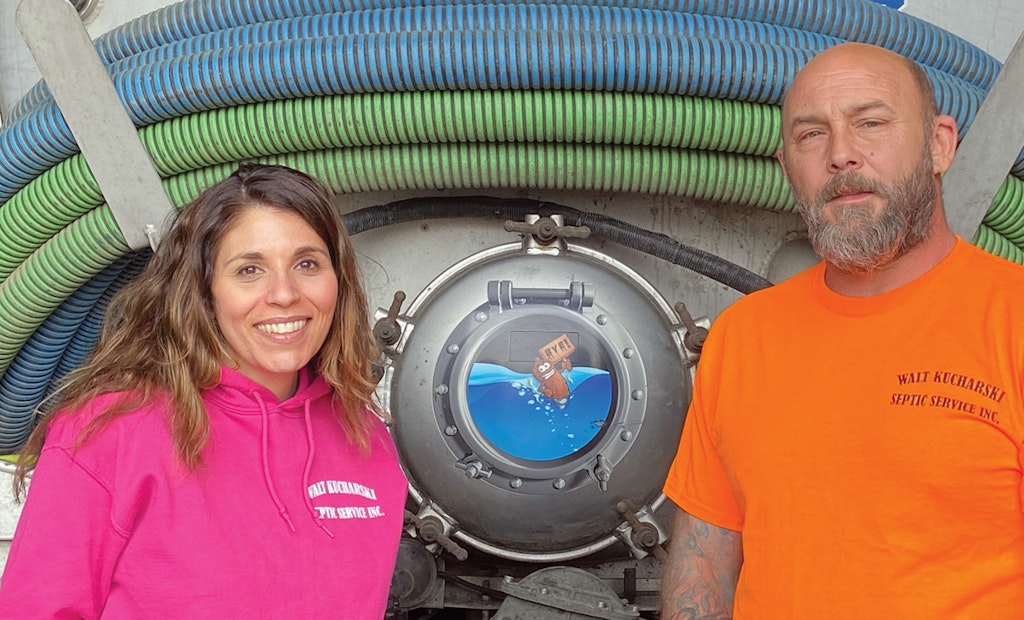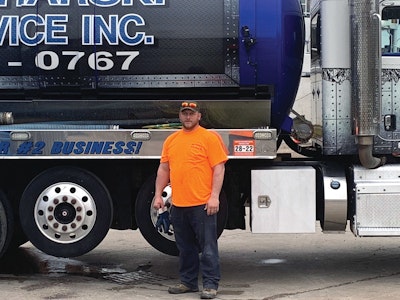
Laurel and Walt Kucharski, 2009 Kenworth with a 5,000-gallon aluminum tank and a National Vacuum Equipment pump.
Interested in Education/Training?
Get Education/Training articles, news and videos right in your inbox! Sign up now.
Education/Training + Get AlertsIn Snapshot, we talk to a member of a state, provincial or national trade association in the decentralized wastewater industry. This time we visit a member of the Ohio Onsite Wastewater Association.
Name and title or job description: Walter Clay Kucharski, president
Business name and location: Walt Kucharski Septic Service, Inc. Our office is in Richfield, Ohio, and we serve eight counties.
Services we offer: Residential and commercial septic tank pumping, bulk hauling, restaurant grease trap pumping, service provider inspections, portable restrooms.
Age: 47
Years in the industry: My father, Walt T. Kucharski, started the company in 1960. I took over in 2011 and incorporated the business.
Association involvement: We’ve been a member of the Ohio Onsite Wastewater Association for three years.
Benefits of belonging to the association: Contact with people in the industry statewide and the education and training that are offered are substantial benefits. There’s an annual conference in Columbus. Networking is huge. If you’re not going to the meetings and classes, you’re missing out.
Biggest issue facing your association right now: Getting information to all the haulers is difficult because many don’t use technology. And if the Association would offer things like health care plans, workers’ compensation, and commercial insurance policies tailored to our industry I think more people would join.
Our crew includes: Kevin Slaughenhoupt is a driver/technician. My wife Laurel does office administration.
Typical day on the job: My day starts around 4 or 5 in the morning. Grease traps are cleaned first, then we move on to commercial and residential septic cleaning. Every day is different. Today we pumped out a research yacht which came into port. My phone is always ringing from vendors calling or daily emergencies. We work in tandem with many service providers and other haulers. It might be passing along emergency calls to each other or working together on especially large projects. We really try to keep the relations positive in our area. There is plenty of work to go around.
The job I’ll never forget: A milk truck broke down and sat for several weeks before the owner got approval to move it. I pumped 4,000 gallons of curdled, spoiled milk. I used to love cheesecake but have never eaten it since. Another unforgettable job was from a prominent chocolate factory in Cleveland. The pumps broke and the place flooded with chocolate. I pumped for several days — just pure chocolate. Of course this happened at Easter.
My favorite piece of equipment: A few years ago I purchased a 2009 Kenworth with a 5,000-gallon tank. Having that capacity really opened up our commercial side — fewer loads, higher volume. We just pulled out 35,000 gallons from a barge on the river and since we now have two 5,000-gallon trucks we were able to do it in three hours. The truck has been a pain in repairs, but it makes the money back every time it goes out.
Most challenging site I’ve worked on: We pumped a grease trap for a downtown casino. The trap was in a parking garage with a 7-foot clearance over 750 feet away. It was very hard to access. It took two of us and we had to bring a pickup truck with extra hose. We’re usually the hauler the other haulers give jobs to. We do long-distancing pumping so we have extra pumps and always carry over 200 feet of hose on all our trucks.
Oops, I wish I could take this one back: We work with a nearby housing development with 141 homes. The residents don’t understand their very unique system (Orenco Systems’ ProSTEP) that only they have in all of Northeast Ohio. They were under the impression they didn’t have to clean their tanks and there was nothing they had to do. Trying to get them to listen to recommendations and maintain their tanks has been challenging. So we get a lot of weekend emergency calls. We feel obligated to do it because they’re in our neighborhood and it’s the neighborly thing to do.
The craziest question I’ve been asked by a customer: A contractor called and asked if we could help him with a dead body. A man who had died while in a hot tub had been there for many days before being discovered. The contractor wanted us to pump all the “goo” in the hot tub. Another time a chicken slaughterhouse wanted us to remove all the waste. Fortunately, both of these jobs are considered hazmat so we could not do them.
If I could change one industry regulation, it would be: Cracking down on the pumpers who cut corners, don’t get properly licensed, illegally dump in fields, undercut prices. It makes it really hard for the ones who are doing it correctly.
Best piece of small business advice I’ve heard: Knowledge is power. My dad always said, “It doesn’t matter what profession you are in, become a master in it, do the best you possibly can.”
If I wasn’t working in the wastewater industry, I would: I was the only son so I really never thought about doing anything else. I went to college, played football, but always knew I would return to the septic business.
Crystal ball time – This is my outlook for the wastewater industry: Education for homeowners is so important — making them aware of the importance of maintaining their systems and educating them on the costs associated in coming to their home (payroll, fuel, disposal, insurance, etc.) This is not a well-respected industry and I would like to see that change. We are essential employees — the pandemic proved that.






